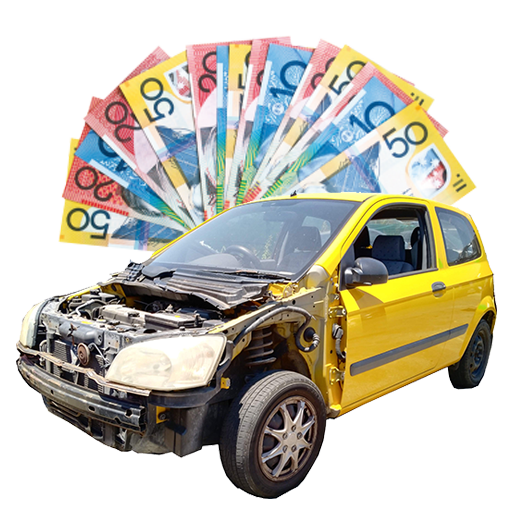Trying to figure out scrap metal car prices in Australia can feel a bit like guesswork. There’s no simple, one-size-fits-all answer. The final price you get really comes down to the ever-changing market rates for different metals, meaning a car could be worth anything from a couple of hundred dollars to well over a thousand, depending on what it’s made of and how much it weighs.
What Is a Scrap Car Actually Worth in Australia?
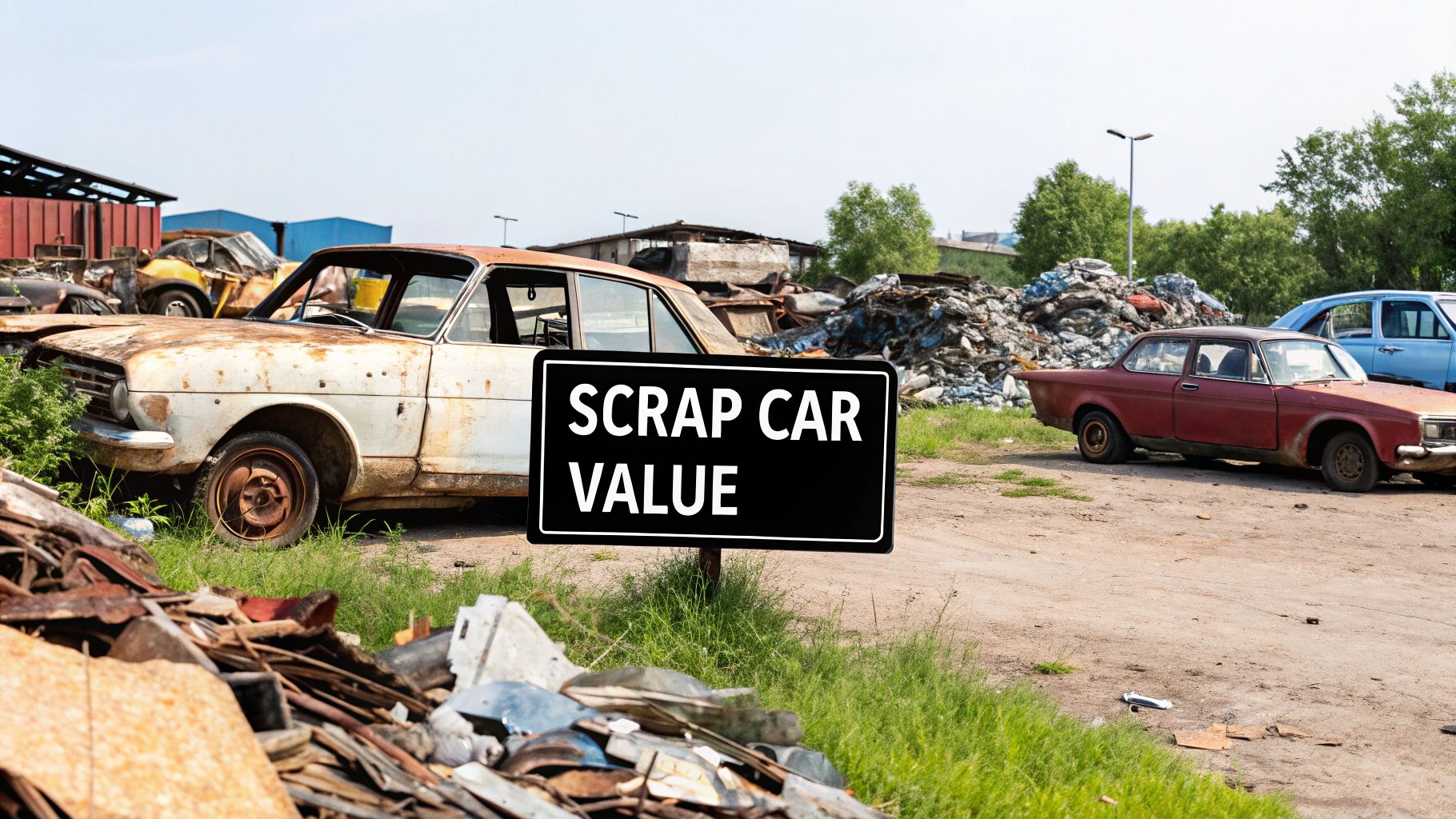
Here's the best way to think about it: your old car isn't really a car anymore. It's a big bundle of raw materials. The cash you get is worked out by adding up the value of all those different "ingredients"—the steel, aluminium, copper, and so on—based on what they're worth per kilo on the day you sell.
Most of a car’s weight, and therefore a large chunk of its scrap value, comes from its steel frame and body. But it's the other, less common metals that often push the price up significantly. Think about the aluminium in the engine block, wheels, or body panels. It’s much lighter than steel, but it’s also a lot more valuable kilogram for kilogram.
Unpacking the Price Components
You'll also find a surprising amount of copper tucked away in the car's wiring and electrical parts. While it doesn't weigh a lot, its high market price adds a nice little bonus to the total value. And don’t forget the catalytic converter; it contains tiny amounts of precious metals like platinum and palladium, making it one of the most valuable single components to recycle.
The key thing to realise is that scrap yards aren't buying your car to fix it up. They're buying it for the raw weight of its metals, which they then sell on to refineries. That’s why a big, heavy 4WD will almost always be worth more than a small hatchback, even if the hatchback is in better condition.
Looking at some real-world figures gives us a clearer picture. Recent industry data shows the average price for a scrap car across Australia sat around $521. Interestingly, the Holden Cruze was the most commonly scrapped model, fetching an average price of about $625. You can actually keep an eye on these trends yourself using CarTakeBack’s Scrap Car Price Index, which tracks the latest prices paid by recycling centres each month.
A Quick Reference for Metal Values
To help you get a better idea of how a scrap yard calculates your car's value, here’s a quick guide to what different metals are typically worth. Just remember, these prices change all the time, sometimes daily, based on what’s happening in the global commodities market.
Typical Scrap Metal Prices per Kilogram in Australia
This table provides a snapshot of the price ranges for common metals found in cars. These are just estimates and can fluctuate with market demand.
| Metal Type | Common Car Parts | Average Price Range (per kg) |
|---|---|---|
| Steel | Body, frame, chassis, doors | $0.10 – $0.30 |
| Aluminium | Engine block, wheels, radiator, panels | $1.00 – $3.00 |
| Copper | Wiring, starter motor, alternator | $5.00 – $10.00 |
| Brass | Radiator fittings, small bushings | $4.00 – $7.00 |
Once you understand how these different parts add up, the whole process of scrap metal car pricing becomes much less of a mystery. You can start to see exactly where the real value in your old car is hiding.
The Key Factors Driving Your Scrap Car's Value
Ever wondered what really goes into the cash offer for your old car? It's not just a random number. Think of it more like a calculation, where five key ingredients determine the final price. While the car's weight is the biggest piece of the puzzle, a few other things can seriously swing the value up or down.
Let's break down what actually matters to a car wrecker.
Your Car’s Physical Attributes
First up, the most straightforward factor: weight and size. This is the bedrock of scrap pricing. A hefty Holden Colorado or a bulky Toyota LandCruiser is packed with far more steel and other metals than a tiny Suzuki Swift. It's simple maths, really—more metal by mass means more raw material for the recycler, and that translates directly into a better starting offer.
But it's not just about raw weight. The make and model of your car also play a surprisingly big role. Some European models, for example, are known for using more high-value aluminium in their engine blocks and body panels. This higher concentration of valuable non-ferrous metal can give them a price advantage over a standard domestic car, even if they aren't the heaviest vehicle on the lot.
Completeness and Condition
This one is crucial: is the car complete? A vehicle that still has its engine, transmission, and catalytic converter is always going to fetch a higher price than a bare-bones shell. Car removal services base their initial quotes on the assumption that they are getting a whole car.
If you're thinking of pulling out the engine or other major parts to sell separately, just be aware that the wrecker will slash their offer. Often, you'll lose more on the scrap price than you'll gain from selling the individual components.
While the overall condition isn't as critical as it is for a drivable car, it can still nudge the price. A car with less rust means there's a higher percentage of good, salvageable metal, which can add a little extra to the final amount.
The Bigger Picture: Market and Location
Finally, there are two powerful outside forces you have no control over: current commodity prices and your location. The global market values for steel, aluminium, and copper fluctuate every single day. A sudden spike in steel demand can boost your car's scrap value overnight, without you lifting a finger.
Where you are in Australia also makes a difference. This comes down to logistics. A car in a major hub like Adelaide is closer to ports and processing facilities, making it cheaper to transport and recycle. This often results in a better offer compared to a car in a remote, rural town where transport costs eat into the profit margin. To get a feel for how this works locally, it's worth checking out specific guides on how much wreckers pay for cars in your area.
So, when you get a quote, it's a blend of these five factors:
- Vehicle Weight & Size: The number one driver of value.
- Make & Model: Dictates the mix of valuable metals inside.
- Completeness: A whole car is worth more than one picked apart.
- Commodity Prices: Global market trends have a direct impact.
- Your Location: How close you are to the recycling infrastructure matters.
Keeping these points in mind helps you understand exactly where their offer is coming from and gives you a much better chance of getting a fair price for your old vehicle.
Unpacking the Metal Value Inside Your Vehicle
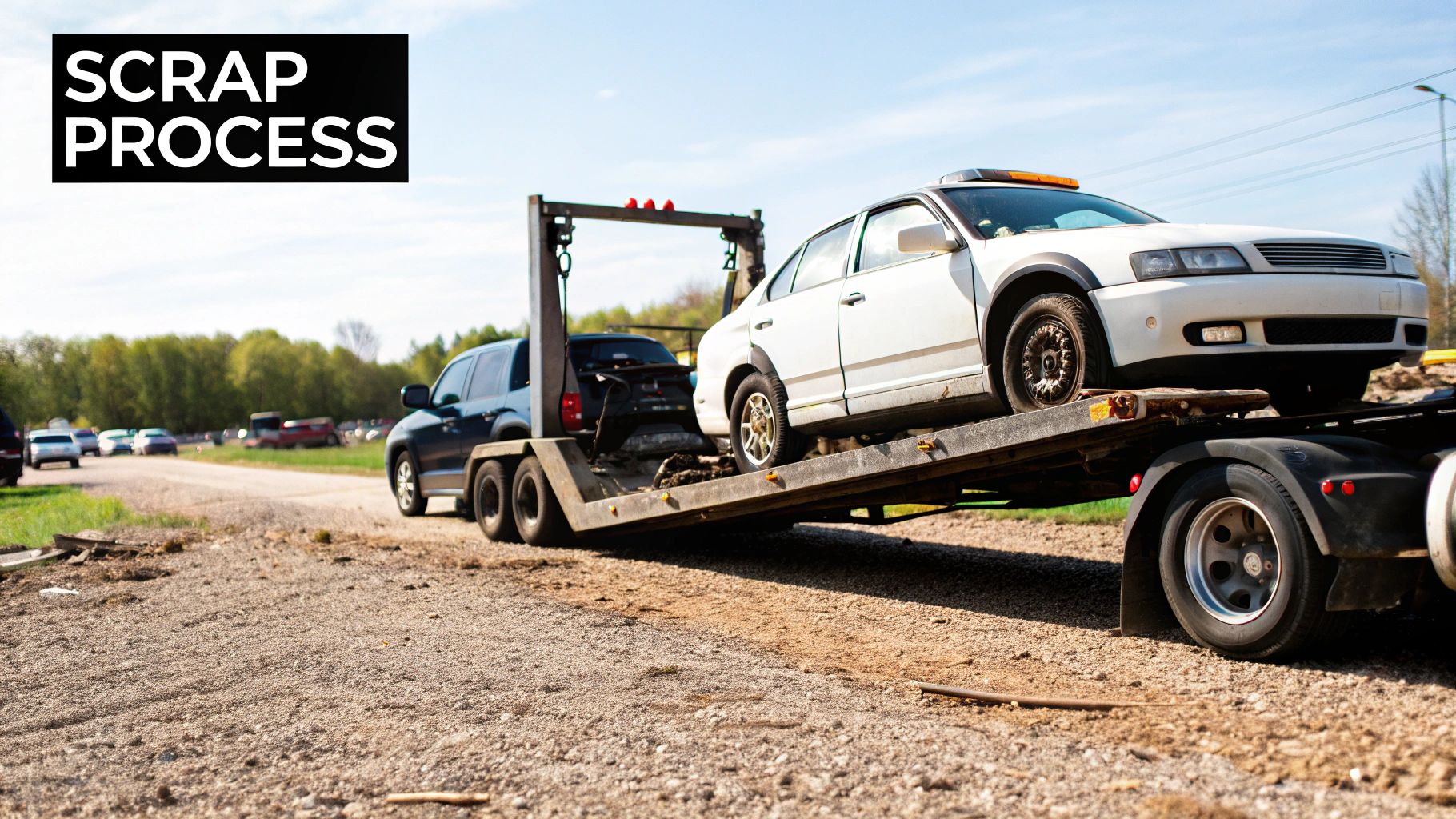
It’s easy to think of an old car as just one big lump of metal. But to a scrap yard, it’s more like a treasure chest filled with different materials, each with its own value. While the total weight of your car gives us a starting point, the final scrap metal car prices really come down to the specific mix of metals inside. Let's create a "metal map" of your vehicle to see where the real value lies.
The journey begins with steel. It's the undisputed heavyweight champion, making up the bulk of your car's weight. The frame, the chassis, the door panels – it's almost all steel. This forms the foundation of your scrap car's value.
But the real money-makers are what we call non-ferrous metals. They don't contain iron, are lighter than steel, and are far more valuable per kilogram.
Beyond the Steel Frame
Aluminium is a major player in this category. Carmakers use it for parts where they need strength without the weight, such as:
- Engine blocks and cylinder heads
- Transmission housings
- Radiators and air conditioning parts
- Alloy wheels and sometimes even body panels
Because aluminium fetches a higher price than steel, cars with more aluminium parts often get a better price at the scrap yard. You'll often find this in high-performance or certain European models, which can sometimes lead to a slightly better payout.
The Hidden Gems of Your Scrap Car
The most valuable materials, however, are often the ones you can't see. Copper is a perfect example. It's the lifeblood of your car's electrical system and a highly prized commodity. Kilometres of copper wiring run through the vehicle, powering everything from the headlights to the stereo. Your starter motor and alternator are also packed with this valuable red metal.
The single most valuable component in your car is often the catalytic converter. This is because it contains tiny amounts of precious metals like platinum, palladium, and rhodium, which are used to clean up exhaust emissions. These metals are incredibly rare and expensive, making the "cat" a top-priority item for any recycler.
The price difference between these metals is huge. To put it in perspective, recent Australian market data shows that standard steel might get you $0.10 to $0.30 per kilogram. In contrast, valuable copper can command between $5.00 and $10.00 per kilogram. Aluminium sits comfortably in the middle, usually trading for $1.00 to $3.00 per kilogram. You can always discover the latest scrap metal prices in Australia to see how these markets are moving.
At the end of the day, a car isn't just a hunk of steel. It's a complex mix of different materials. Understanding this helps you see how scrap yards calculate their offers—they’re adding up the value of each and every metal to arrive at a fair, comprehensive price for your vehicle.
How Your Location Changes the Price You Get
Ever wondered why a quote for your old car in Perth might be completely different from one in Sydney or a small country town? It might seem odd, but geography plays a massive role in scrap metal car prices. Where you live can directly affect how much cash ends up in your pocket, and it all boils down to local economics and simple logistics.
Think of it from the scrap yard's perspective. Their profit is tied to their operating costs, and one of the biggest costs is transport. They have to move processed metal from their yard to its next destination, which could be a steel mill across the country or a shipping port for export.
City Convenience vs. Rural Realities
If your car is parked in a major city like Adelaide or Melbourne, you're in a good spot. These metro areas are industrial hubs, often close to big processing facilities and export ports. That short distance means lower transport costs for the scrap yard, and they can usually pass those savings on to you with a better offer.
But if you're out in a more remote or rural area, the numbers start to look different. The yard has to account for the extra fuel and time needed to get to you. Then, they have to haul the processed metal a much longer way to find a buyer. Those extra expenses naturally eat into the price they can offer for your vehicle.
The price you are quoted is a direct reflection of local market conditions. This includes the distance to recycling infrastructure, the strength of regional industrial demand, and even the number of competing scrap services in your area.
A Closer Look at the Western Australian Market
Western Australia is a fantastic real-world example of how these regional factors work. The state's massive mining and industrial sectors create a strong, localised demand for both recycled metals and used auto parts. This unique local economy directly influences what buyers are willing to pay.
For instance, over the last year, scrap car prices in Western Australia averaged around AUD 562. Most offers fell somewhere in the AUD 527 to AUD 595 range. This specific pricing isn't just about global metal prices; it's a direct result of the logistical and economic realities within WA. You can find out more about how regional markets affect scrap car prices to see how your own area stacks up.
Ultimately, knowing how location affects value helps you understand the quote you receive. It also highlights why it’s so important to get quotes from a few different local services to find the best possible price for your specific area.
Proven Tips to Get More Cash for Your Scrap Car
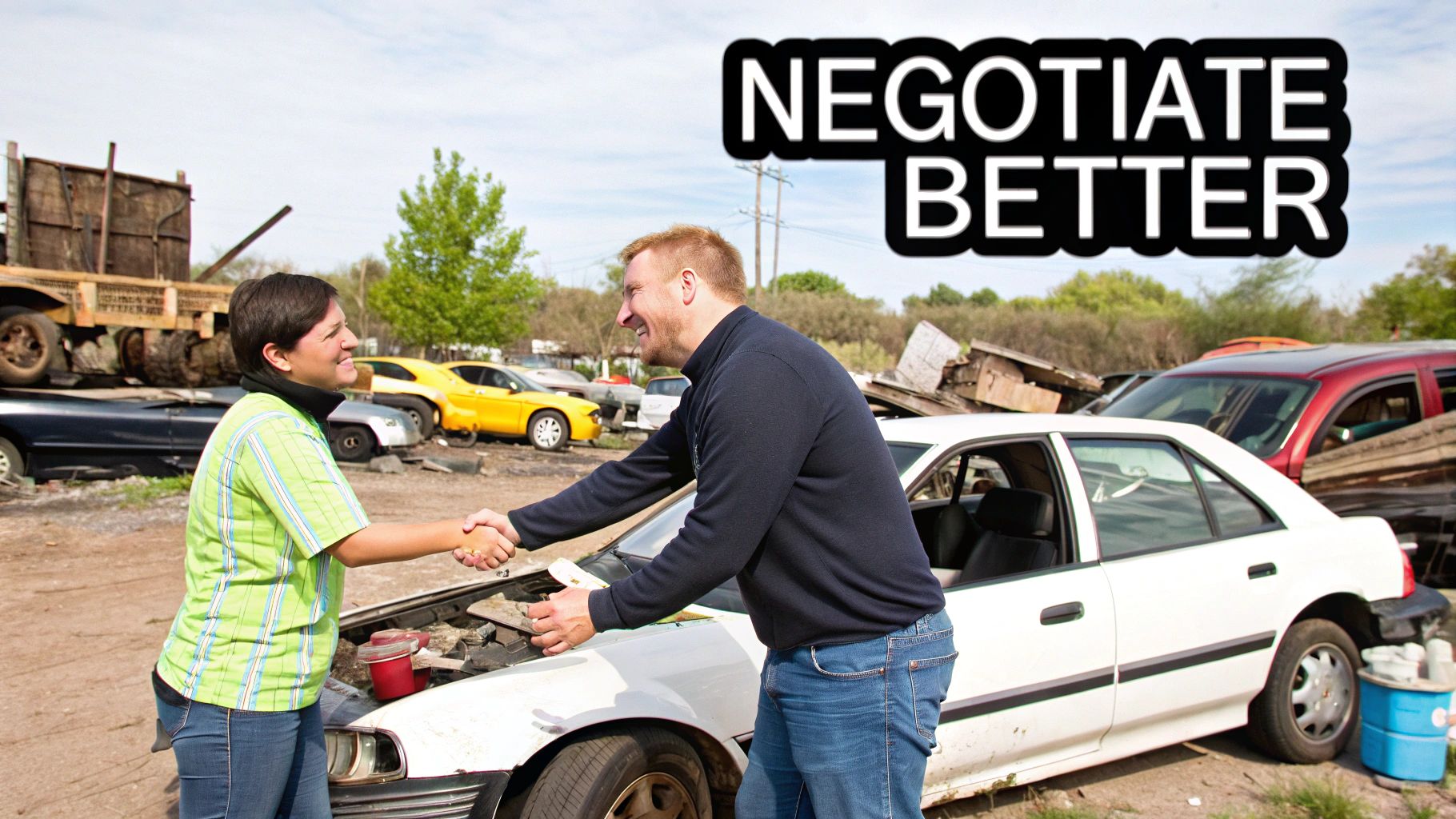
Knowing what affects scrap metal car prices is a great start, but the real trick is using that knowledge to your advantage. A few smart moves can put you in the driver's seat of the negotiation, helping you walk away with the best possible price for your old car.
If there's one thing you do, make it this: get multiple quotes. It’s the single most effective way to boost your payout. Never, ever take the first offer you get.
Think about it. When you’re buying a new TV, you shop around. Selling your car should be no different. Call at least three local car removal services. When buyers know they have competition, they’re forced to put their best foot forward. You'd be surprised how much more you can get just by making a few extra phone calls.
Prepare for a Smooth Transaction
When the tow truck arrives, being ready makes all the difference. Have your proof of ownership—like your registration papers—and a photo ID handy. If you still have the keys, have those ready, too.
This simple bit of preparation signals to the buyer that you’re organised and serious. It eliminates any chance for last-minute haggling or frustrating delays, ensuring the whole process is quick and professional for both of you.
A word of caution: many people think they can make more money by stripping parts like the battery or tyres to sell separately. This almost always backfires. Scrap yards base their offers on the value of a complete vehicle. If they show up and find a car missing key components, they’ll slash the price—often by more than you made selling the parts.
Look for Value-Added Services
Here’s a detail that directly affects your bottom line: the tow. Always, and I mean always, choose a buyer who offers free car removal.
Towing fees can easily run $100 or more, and that money comes straight out of your pocket. By choosing a reputable service that includes towing at no cost, you guarantee the quoted price is what you actually receive.
For example, when exploring options to get cash for cars in Adelaide for old cars, confirming free removal is a non-negotiable. It’s an effortless way to make sure you keep every dollar you’re owed.
Your Step-By-Step Guide to the Scrapping Process
Let's be honest, the thought of scrapping a car can seem a bit daunting if you've never done it before. But in reality, it's a surprisingly simple process. Once you know the steps, you can go from having an old car taking up space to having cash in your pocket in no time.
It all starts with a bit of research. The first thing you'll want to do is reach out to a few local car removal companies to get a quote. They'll ask for the basics: the car's make, model, year, and its general condition. This info gives them a starting point to figure out how much it's worth, mostly based on its weight.
From Quote to Collection
After you've shopped around and picked the best offer, it's time to book the pickup. The company will work with you to find a convenient time.
Before they show up, you have a couple of small jobs to do:
- Clean it out: Go through the car one last time. Check the glove box, under the seats, and in the boot for any personal items. You’d be surprised what gets left behind!
- Get your documents ready: You'll need proof of ownership (like the registration papers) and a valid photo ID. Having these on hand makes the whole process a lot smoother.
This simple infographic gives you a great visual of what happens after your car is picked up.
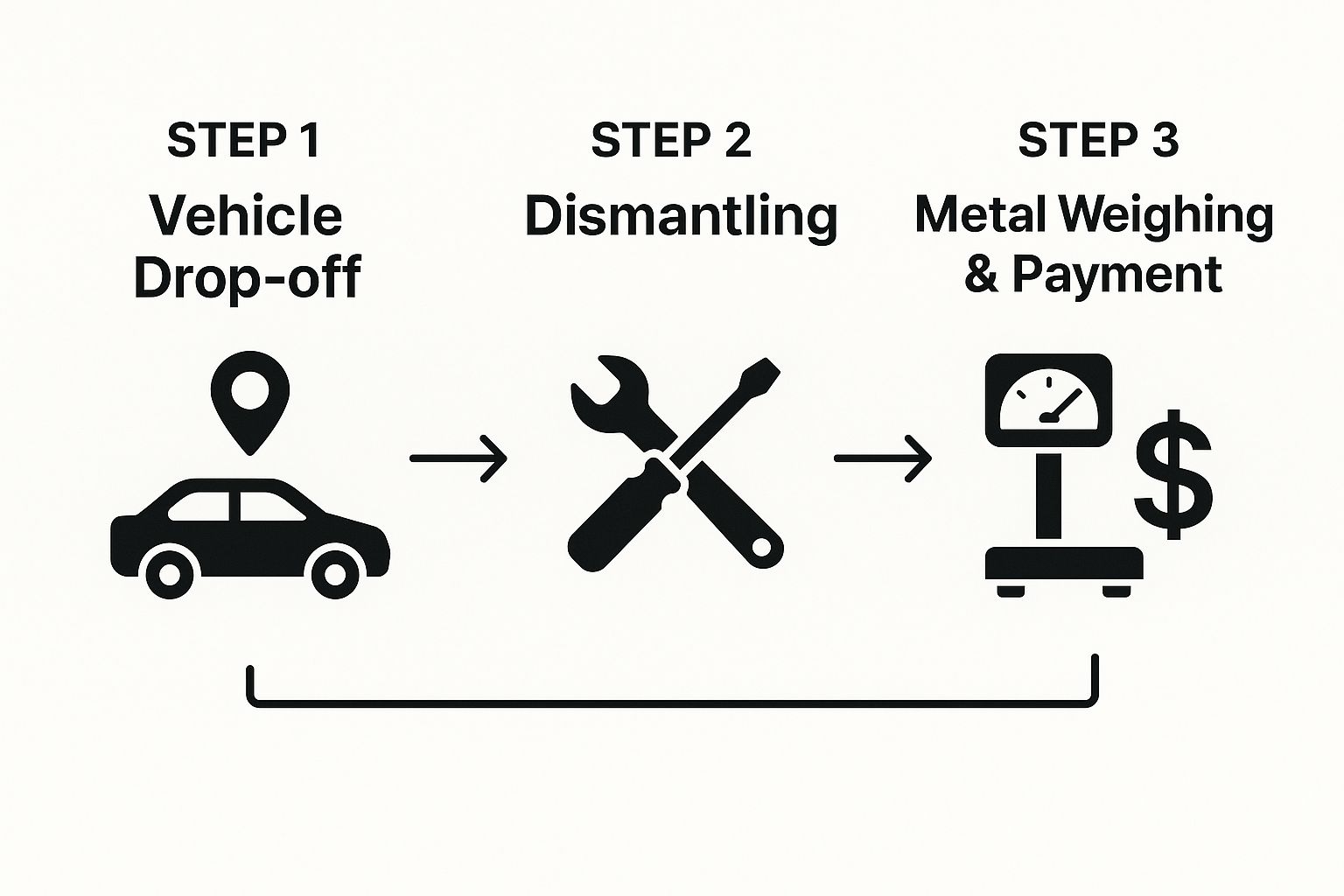
As you can see, once it gets to the yard, it's a well-oiled machine from drop-off to payment.
The Handover and Final Steps
When the tow truck driver arrives, they'll do a quick inspection. This isn't a deep dive; they're just making sure the car is as you described it. They'll check that it's whole and hasn't had major components like the engine or catalytic converter ripped out.
Once everything checks out and the price is confirmed, you'll sign some paperwork, hand over the keys and ownership documents, and get paid right then and there. Then, they'll load up the car and haul it away. Simple as that.
There is one last, crucial thing you absolutely must do: handle the notice of disposal. You need to inform your state's transport authority that you've sold the vehicle. This is a non-negotiable step that officially transfers ownership and protects you from any future fines or tolls linked to that car.
For a really detailed walkthrough, have a look at our ultimate guide to scrapping a car in Australia. It covers everything you need to know to make sure you've got all your bases covered.
Got Questions About Scrap Car Prices? We’ve Got Answers.
When you're ready to part with an old car, it’s completely normal to have a few last-minute questions buzzing around. Getting the right information upfront makes the whole process smoother and helps you know you're getting a fair deal. Let's clear up some of the most common queries we hear.
Will I Get More Cash if My Car Still Drives?
This is one of the biggest points of confusion, and the answer might surprise you. From a scrap metal point of view, a running engine doesn't really move the needle on price.
Scrap yards are in the business of recycling raw materials. Their offer is almost entirely based on your car's weight in metal. A functioning engine or transmission doesn't add much to that equation. If your car is still roadworthy, you might find it has more value to a private buyer or a second-hand parts dealer. It's always smart to get quotes from a few different places to see where your vehicle is valued most.
What Paperwork Do I Need to Scrap My Car in Australia?
To scrap your car legally, you'll need to prove you own it. This usually just means having your vehicle's registration papers and a valid photo ID, like your driver's licence, handy.
The most important step happens right after you've sold the car. You must lodge a Notice of Disposal with your state or territory's transport authority. This is non-negotiable, as it officially signs over responsibility and protects you from any future fines, tolls, or registration bills linked to that vehicle.
Should I Strip Parts Off My Car Before It’s Towed Away?
It can be tempting to pull off the battery, tyres, or alternator to try and make a few extra bucks on the side. Honestly, this strategy usually backfires.
Most car removal services and scrap yards calculate their quotes based on a complete vehicle. If they show up to collect your car and find key components missing, they will almost certainly lower their offer on the spot. More often than not, the deduction they make is far greater than the small amount you'd earn selling the parts individually. For the best scrap price, leave the car as it is.
Ready to turn your old car into instant cash? At Auto Removal Adelaide, we offer top dollar for unwanted vehicles across Adelaide. We provide free car removal and pay you on the spot—it's that easy. Get your free, no-obligation quote today at https://autoremovaladelaide.com.au.

